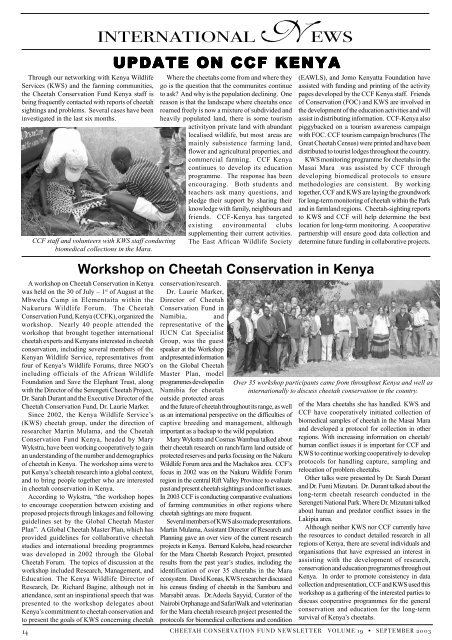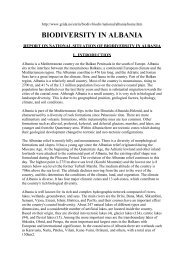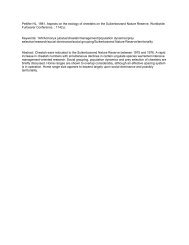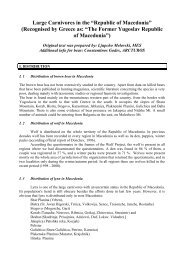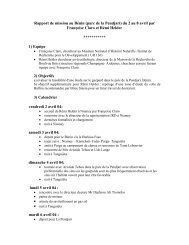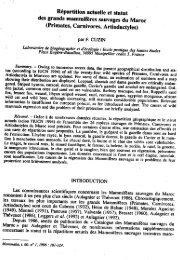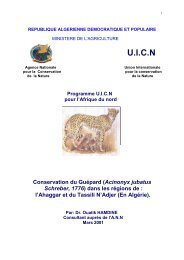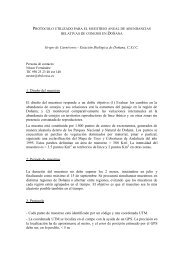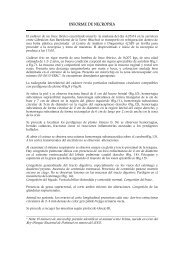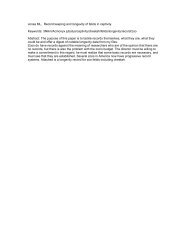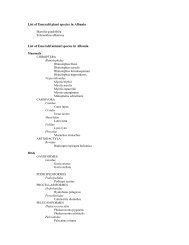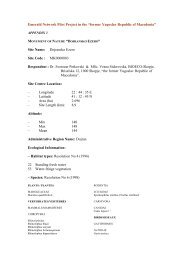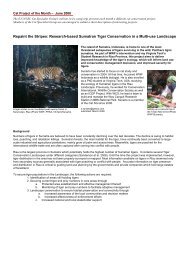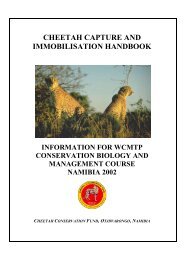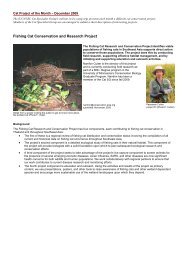CHEETAH CONSERVATION FUND - Cat Specialist Group
CHEETAH CONSERVATION FUND - Cat Specialist Group
CHEETAH CONSERVATION FUND - Cat Specialist Group
You also want an ePaper? Increase the reach of your titles
YUMPU automatically turns print PDFs into web optimized ePapers that Google loves.
Through our networking with Kenya Wildlife<br />
Services (KWS) and the farming communities,<br />
the Cheetah Conservation Fund Kenya staff is<br />
being frequently contacted with reports of cheetah<br />
sightings and problems. Several cases have been<br />
investigated in the last six months.<br />
14<br />
INTERNATIONAL N EWS<br />
CCF staff and volunteers with KWS staff conducting<br />
biomedical collections in the Mara.<br />
UPDATE UPDATE ON ON CCF CCF KENYA<br />
KENYA<br />
Where the cheetahs come from and where they<br />
go is the question that the communites continue<br />
to ask? And why is the population declining. One<br />
reason is that the landscape where cheetahs once<br />
roamed freely is now a mixture of subdivided and<br />
heavily populated land, there is some tourism<br />
activityon private land with abundant<br />
localised wildlife, but most areas are<br />
mainly subsistence farming land,<br />
flower and agricultural properties, and<br />
commercial farming. CCF Kenya<br />
continues to develop its education<br />
programme. The response has been<br />
encouraging. Both students and<br />
teachers ask many questions, and<br />
pledge their support by sharing their<br />
knowledge with family, neighbours and<br />
friends. CCF-Kenya has targeted<br />
existing environmental clubs<br />
supplementing their current activities.<br />
The East African Wildlife Society<br />
(EAWLS), and Jomo Kenyatta Foundation have<br />
assisted with funding and printing of the activity<br />
pages developed by the CCF Kenya staff. Friends<br />
of Conservation (FOC) and KWS are involved in<br />
the development of the education activities and will<br />
assist in distributing information. CCF-Kenya also<br />
piggybacked on a tourism awareness campaign<br />
with FOC. CCF tourism campaign brochures (The<br />
Great Cheetah Census) were printed and have been<br />
distributed to tourist lodges throughout the country.<br />
KWS monitoring programme for cheetahs in the<br />
Masai Mara was assisted by CCF through<br />
developing biomedical protocols to ensure<br />
methodologies are consistent. By working<br />
together, CCF and KWS are laying the groundwork<br />
for long-term monitoring of cheetah within the Park<br />
and in farmland regions. Cheetah-sighting reports<br />
to KWS and CCF will help determine the best<br />
location for long-term monitoring. A cooperative<br />
partnership will ensure good data collection and<br />
determine future funding in collaborative projects.<br />
Workshop on Cheetah Conservation in Kenya<br />
A workshop on Cheetah Conservation in Kenya<br />
was held on the 30 of July – 1 st of August at the<br />
Mbweha Camp in Elementaita within the<br />
Nakururu Wildlife Forum. The Cheetah<br />
Conservation Fund, Kenya (CCFK), organized the<br />
workshop. Nearly 40 people attended the<br />
workshop that brought together international<br />
cheetah experts and Kenyans interested in cheetah<br />
conservation, including several members of the<br />
Kenyan Wildlife Service, representatives from<br />
four of Kenya’s Wildlife Forums, three NGO’s<br />
including officials of the African Wildlife<br />
Foundation and Save the Elephant Trust, along<br />
with the Director of the Serengeti Cheetah Project,<br />
Dr. Sarah Durant and the Executive Director of the<br />
Cheetah Conservation Fund, Dr. Laurie Marker.<br />
Since 2002, the Kenya Wildlife Service’s<br />
(KWS) cheetah group, under the direction of<br />
researcher Martin Mulama, and the Cheetah<br />
Conservation Fund Kenya, headed by Mary<br />
Wykstra, have been working cooperatively to gain<br />
an understanding of the number and demographics<br />
of cheetah in Kenya. The workshop aims were to<br />
put Kenya’s cheetah research into a global context,<br />
and to bring people together who are interested<br />
in cheetah conservation in Kenya.<br />
According to Wykstra, “the workshop hopes<br />
to encourage cooperation between existing and<br />
proposed projects through linkages and following<br />
guidelines set by the Global Cheetah Master<br />
Plan”. A Global Cheetah Master Plan, which has<br />
provided guidelines for collaborative cheetah<br />
studies and international breeding programmes<br />
was developed in 2002 through the Global<br />
Cheetah Forum. The topics of discussion at the<br />
workshop included Research, Management, and<br />
Education. The Kenya Wildlife Director of<br />
Research, Dr. Richard Bagine, although not in<br />
attendance, sent an inspirational speech that was<br />
presented to the workshop delegates about<br />
Kenya’s commitment to cheetah conservation and<br />
to present the goals of KWS concerning cheetah<br />
conservation/research.<br />
Dr. Laurie Marker,<br />
Director of Cheetah<br />
Conservation Fund in<br />
Namibia, and<br />
representative of the<br />
IUCN <strong>Cat</strong> <strong>Specialist</strong><br />
<strong>Group</strong>, was the guest<br />
speaker at the Workshop<br />
and presented information<br />
on the Global Cheetah<br />
Master Plan, model<br />
programmes developed in<br />
Namibia for cheetah<br />
outside protected areas<br />
and the future of cheetah throughout its range, as well<br />
as an international perspective on the difficulties of<br />
captive breeding and management, although<br />
important as a backup to the wild population.<br />
Mary Wykstra and Cosmas Wambua talked about<br />
their cheetah research on ranch/farm land outside of<br />
protected reserves and parks focusing on the Nakuru<br />
Wildlife Forum area and the Machakos area. CCF’s<br />
focus in 2002 was on the Nakuru Wildlife Forum<br />
region in the central Rift Valley Province to evaluate<br />
past and present cheetah sightings and conflict issues.<br />
In 2003 CCF is conducting comparative evaluations<br />
of farming communities in other regions where<br />
cheetah sightings are more frequent.<br />
Several members of KWS also made presentations.<br />
Martin Mulama, Assistant Director of Research and<br />
Planning gave an over view of the current research<br />
projects in Kenya. Bernard Kuloba, head researcher<br />
for the Mara Cheetah Research Project, presented<br />
results from the past year’s studies, including the<br />
identification of over 35 cheetahs in the Mara<br />
ecosystem. David Konas, KWS researcher discussed<br />
his census finding of cheetah in the Samburu and<br />
Marsabit areas. Dr.Adeela Sayyid, Curator of the<br />
Nairobi Orphanage and SafariWalk and veterinarian<br />
for the Mara cheetah research project presented the<br />
protocols for biomedical collections and condition<br />
Over 35 workshop participants came from throughout Kenya and well as<br />
internationally to discuss cheetah conservation in the country.<br />
of the Mara cheetahs she has handled. KWS and<br />
CCF have cooperatively initiated collection of<br />
biomedical samples of cheetah in the Masai Mara<br />
and developed a protocol for collection in other<br />
regions. With increasing information on cheetah/<br />
human conflict issues it is important for CCF and<br />
KWS to continue working cooperatively to develop<br />
protocols for handling capture, sampling and<br />
relocation of problem cheetahs.<br />
Other talks were presented by Dr. Sarah Durant<br />
and Dr. Fumi Mizutani. Dr. Durant talked about the<br />
long-term cheetah research conducted in the<br />
Serengeti National Park. Where Dr. Mizutani talked<br />
about human and predator conflict issues in the<br />
Lakipia area.<br />
Although neither KWS nor CCF currently have<br />
the resources to conduct detailed research in all<br />
regions of Kenya, there are several individuals and<br />
organisations that have expressed an interest in<br />
assisting with the development of research,<br />
conservation and education programmes through out<br />
Kenya. In order to promote consistency in data<br />
collection and presentation, CCF and KWS used this<br />
workshop as a gathering of the interested parties to<br />
discuss cooperative programmes for the general<br />
conservation and education for the long-term<br />
survival of Kenya’s cheetahs.<br />
<strong>CHEETAH</strong> <strong>CONSERVATION</strong> <strong>FUND</strong> NEWSLETTER VOLUME 19 • SEPTEMBER 2003


